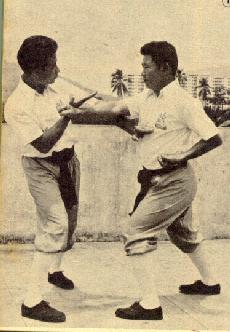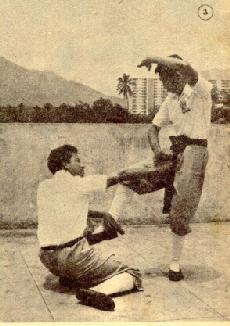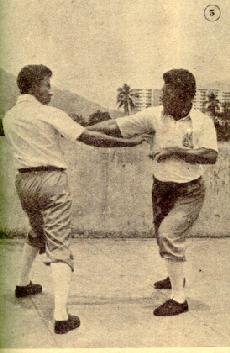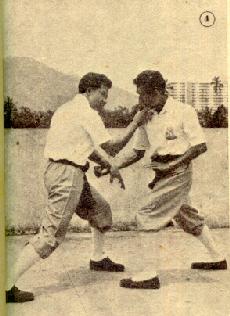July 2001 (Part 3)
SELECTION OF QUESTIONS AND ANSWERS

Combat application of Wing Choon Kungfu. As the attacker executes a thrust punch, Sifu Cheong Wai Poh deflects the attack with his right hand, and simultaneously counter-strikes the opponent's chest with his left hand. This is an application of the sissors-hands in Wing Choon Kungfu, a technique which some exponents mistakenly think has little combat function. Sifu Cheong lives in Malaysia.
Question 1
Why will no masters come forward to conclusively prove once and for all that qi is real and that qi-gong is not a fake healing art. It seems to me a lot more Westerners would be willing to accept and try qi-gong if there was a demonstration, a scientifically designed study that conclusively demonstrated qi-gong's effects.
— Paul, USA
Answer
Numerous experiments were carried out under strict scientific conditions both inside China and outside which proved conclusively that qi is real, and that qigong, besides having other uses, is a genuine healing art.
For example, the Qing Hua University in Bejing, one of the most prestigious universities of China, conducted many experiments with the great qigong master, Yan Xin, which showed that qi is real and has measurable influences on matter. These scientific experiments were supervised by top Chinese scientists, including Professor Qian Xue Sen, the father of the Chinese rocket.
Numerous hospitals in China, particularly the People's Hospital of Shanghai, conducted many scientific experiments which conclusively showed that practising qigong enables many patients to recover from their diseases.
Numerous scientific experiments were also conducted outside China. Dr Kenneth Sancier of the United States, whom I had the pleasure to meet at the Second World Qigong Congress in San Francisco in 1997, is a leader in this field, and he has tirelessly collected volumes of scientific reports on qigong, gallantly attempting to bring its wonderful benefits to the Western public.
At this Second World Qigong Congress, Professor Fang Li Da of China, a medical doctor trained at the world-famous Harvard School of Medicine, provided convincing evidence from her many years of research that practising qigong can overcome cancer. For her brilliant research, she was named “Qigong Research Scientist of the Year”.
There were many top scientists and qigong masters at this Second World Qigong Congress. A special committee edited the findings and reports of the Congress and submitted recommendations to relevant authorities at both the United States government and the United Nations Organization.
The question remains. Why is qigong not widely used to overcome diseases, especially so-called incurable diseases like cancer, cardio-vascular disorders, diabetes and asthma, against which qigong is said, in fact has been proven, to overcome?
There are many answers, and different people will give different answers according to their perspectives. To me, there are two important answers, the relevance of which may not be easily understood by the public. One, genuine qigong masters are basically qigong masters, not marketing experts. They do not have the means, or the interest, to let the world know of their abilities to cure illness. Two, marketing experts who are already enjoying handsome rewards for their effort, may not like qigong to disrupt the de facto situation.
At the International Congress for the Unity of Science held at Seoul in the year 2000 where Nobel Prize winners and top practitioners of their respective fields were invited, I was honoured to speak on qigong. Answering a request from the Congress committee on alternative medicine, I recommended a simple, direct yet scientific approach to test the effectiveness of qigong in overcoming so-called incurable diseases as follows.
Let a medical committee selects a group of patients with a so-called incurable disease. Also selects a control group. Let a genuine qigong master work with the group of patients for six months. Examine the health conditions of the patients at the start, the middle and the end of the six-month period using standard medical tests. Compare the results with the control group.
I knew my proposal was only an academic issue. As expected, no one has thought it worthwhile to implement the recommendation.
Question 2
In fact, James Randi, a professional sceptic, is offering 1 million US dollars to anyone who can prove that qi is real.
Answer
In fact, qi has been proven to be real numerous times. Virtually all those who have attended my intensive chi kung courses have no doubt that qi is real, though neither they nor I proved it quantitatively or mechanically.
Indeed, the question was never asked, partly because the answer was perceptively felt, and partly because the result had rendered the question unimportant. If you, for example, were depressed or had diabetes, but after practising qigong for a few months you felt cheerful or could take sugar without ill effect, you would not be bothered whether qi was real.
In the 1960s or 70s (I can't remember the dates accurately), qigong masters like Lin Hou Sheng proved the reality of qi scientifically. They transmitted their qi to some scientific instruments which showed that qi consists of various infra-red rays, sub-sonic waves and static energy. But a sceptic could argue that was not qi, it was only various forms of rays, waves or energy.
A few well-intended persons have suggested that I take up the James Randi challenge. I have not, for various reasons. The foremost reason is that I have been very busy. Another reason is that while I would like to work with someone sincerely wanting to test the validity of qigong's claims, I feel uncomfortable working with professional sceptics whose expressed intention is to discredit you.

The opponent pushes aside Sifu Cheong's attack and executes a snap kick at Sifu Cheong's genitals. Sifu Cheong squats down slightly to his right side, brushes aside the opponent's kick with his left hand, and simultaneously strikes the opponent's groin with his right hand. This is another application of the scissors-hands.
Question 3
Surely this would allow more citizens of the world to take those first tentative steps forward and begin to benefit from qi-gong.
Answer
I have no doubt about your sincerity, but your statement manifests a difference of attitude which many people especially in the West may not realize. Many people seem to believe that it is the duty of a qigong master to expose his art and share it with others. Not only this, but the onus rests on him. He has to make his art available to anyone who desires it.
The traditional attitude of the masters is reverse. They feel that it is a master's duty to preserve the art for the deserving few, and not — to put it crudely — to cast pearls before swines. The onus is on the students; if they really want the art they have to seek the masters and work hard for it — not that the masters purposely make it hard for them, but mastering any art demands hard work.
When I was much younger, I felt the way you do. I remember clearly I once asked my beloved master, Sifu Ho Fatt Nam, who had abilities most people would not believe. I did not ask him his miraculous abilities, I only asked him the basics. “Sifu,” I respectfully asked, “you have such remarkable abilities that can benefit the world. Would you consider letting the world know about your abilities?”
He kindly replied, “You are still young and naïve. You will understand better when you are older. There is no doubt our art is wonderful. Teach it to the deserving, not simply to any Tom, Dick and Harry.”
As the years went by, my sifu's wisdom becomes more and more obvious. Just recently Roberto, my disciple in Italy, found one of the undeserving. He knew a woman who had been very depressed. He telephoned her, and she was convinced that qigong could overcome her depression (which actually is easy).
“You are lucky,” Roberto said, “the master is now in Finale Ligure. Come to his qigong class.” “Oh! it is too troublesome. Why doesn't he come to Genoa?” (Genoa is about an hour drive from Finale Ligure.) “It's just too bad,” Roberto told me, “I'm sure qigong will help her overcome depression, but she doesn't have the good karma, she doesn't deserve to learn this wonderful art.”
Question 4
I respect the fact that some masters do not wish to waste their time with public demonstrations, or feel that this type of knowledge is only for certain select individuals. But I admire the fact that you have become a champion for breaking down these walls of secrecy and allowing everyone to benefit from qi-gong's marvellous effects.
Answer
Thank you for your kind words. While I have been generous in my teaching, and have explained methods and philosophy which many other teachers would have regarded as top secrets, I have maintained the time-honoured tradition of teaching only the deserving.
What many people, including those who have learnt from me, may not realize is this. There is so much scope and depth in the Shaolin arts that when they only touch the surface they mistakenly think they have reached the bottom.
Today qigong and kungfu have been so watered down to some sort of dance and gymnastics that when students experience internal energy flow and can apply Shaolin techniques effectively to combat, they rightly feel their accomplishments fantastic. They often forget, and may find it hard to imagine, that such accomplishments though remarkable when compared to dance and gymnastics, are actually the beginning of a long journey to perfection.

In another example, the opponent executes a thrust punch at Sifu Cheong's solar plexus using a Sideway Bow-Arrow Stance. Sifu Cheong turns his body to his left side also using a Sideway Bow-Arrow Stance, brushes away the attack wtih his left hand, and simultaneously counter-strikes the opponent's vital point at his armpit with the right hand, using a Wing Choon patttern called “shooting fingers”, or “phiew zhi” in Chinese (Cantonese).
Question 5
Some people have told me that kungfu isn't really good if you want to learn self defense, but that doesn't bother me anyway since I can already defense my self quite easily against large groups of kids.
— Stuart, England
Answer
Kungfu is excellent for self defence. But the big problem is today kungfu has been so diluted that most kungfu students learn only external kungfu forms. They have never learnt force training and combat application, which are two essential aspect of kungfu for combat. And they go into sparring haphazardly.
As a result they spar like children or use karate or taekwondo techniques instead. On the other hand many students practise a modernize form of kungfu called wushu, which is solely performed for demonstration, and not for self defence.
Question 6
Would Wing Chun Kungfu or any form of kungfu suit me?
Answer
Yes, Wing Chun Kungfu will suit you. Of the many kungfu styles today, Wing Chun practitioners are well known for their fighting abilities. This is not because Wing Chun is more effective for fighting than any other kungfu styles, but because Wing Chun instructors generally teach their students how to fight, whereas instructors of most other styles do not. And England has many good Wing Chun masters. Other forms of kungfu will also suit you if the teachers teach kungfu, and not just kungfu forms.

The opponent rotates his body slightly to his right and with his left hand sweeps away Sifu Cheong's right hand attack. (These movements are not shown in the picture.) Following the momentum he moves his left leg forward in between Sifu Cheong's legs and simultaneously swings his right fist at Sifu Cheong's groin.
Question 7
I really want to learn kungfu and I would dedicate my life to mastering it. I believe if I tried hard enough I would become a great master and a better person.
Answer
I am glad you aim to become a kungfu master one day. If you have good teachers and are willing to train hard, you will achieve your aim. But first of all you have to become a good student. Practising real kungfu will certainly make you a better person.
You must also realize that while kungfu training is great, you have to spend time on other aspects of your life, such as spending time on your studies, with your friends, and for your parents.
As you are going to dedicate your time to kungfu, you should first of all have a good knowledge of its scope and depth. Be aware that while many styles of kungfu are basically physical fighting arts, great kungfu like Shaolin and Taijiquan is also practised for spiritual cultivation. But you have to learn from real Shaolin or Taijiquan masters. Most mediocre Shaolin and Taijiquan instructors teach them as gymnastics or dance.
Question 8
I will also be visiting you in a few years (once I save enough money). I wish to meet the man behind the legend and if possible study with you.
Answer
I am glad you wish to visit me one day. I shall look forward to meet you. If you attend my Intensive Shaolin Kungfu Course in Malaysia, you will be surprised at its richness and potentials. After having attended the course, many students expressed that they had not expected Shaolin Kungfu to be so wonderful.
Question 9
I also was wondering if you could please recommend any books that you think are worth a read. I am interested in spiritual enlightenment and the history and philosophy of kungfu.
Answer
You should read my books, “The Art of Shaolin Kung Ku” and “The Complete Book of Zen”. They are at present out of stock but will be published by Random House soon.
“The Art of Shaolin Kung Ku” gives the history and philosophy of kungfu, describes internal force training and explains combat application. “The Complete Book of Zen” explains what spiritual enlightenment is, and provides many exercises for you to practise Zen.
